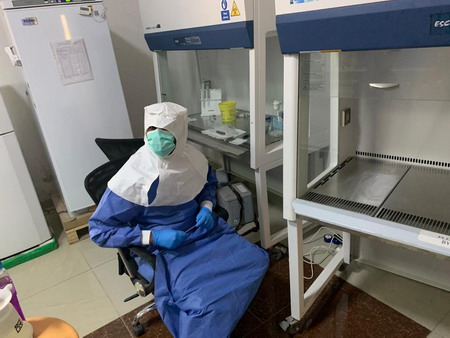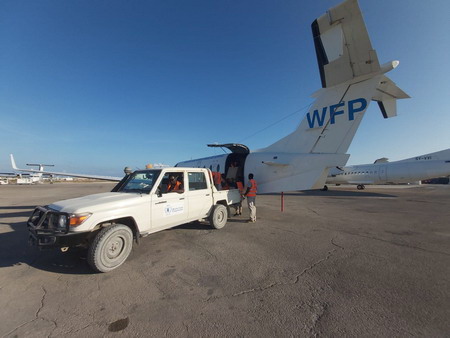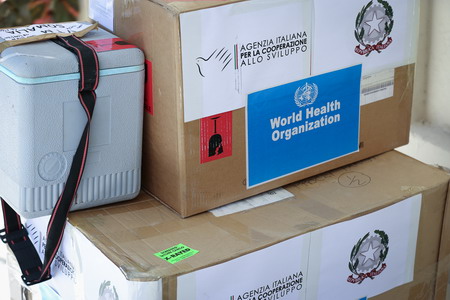 As the COVID-19 pandemic escalates the WHO country office has helped Somalia rapidly build and scale up the testing capacity for COVID-19 in Somalia.
As the COVID-19 pandemic escalates the WHO country office has helped Somalia rapidly build and scale up the testing capacity for COVID-19 in Somalia.
In March 2020, when the country’s first case of COVID-19 was laboratory-confirmed in Somalia, the country had no capacity for testing and diagnosis of COVID-19. WHO sent nasopharyngeal swab from 4 returnee travellers, all Somali citizens, to Kenya Medical Research Institute (KEMRI) in Nairobi which has an accredited Biosafety Level-2 (BSL-2) laboratory for viral and emerging pathogens supported by WHO and the United States Centers for Disease Prevention and Control. On 16 March, WHO received the laboratory test result of these 4 samples, of which one tested positive. This was the first reported case of COVID-19 in Somalia which was travel-associated.
The Ministry of Health and Human Services of the Federal Government of Somalia officially confirmed the first COVID-19 case in Somalia immediately after the test result was officially communicated by WHO to the Ministry.
Building testing capacity
Since then the WHO country office has shipped over 150 samples collected from different parts of the country to KEMRI and many of them have tested positive. Considering that the country would need to build its testing capacity rapidly for COVID-19 and decentralize laboratory testing in order to rapidly isolate and treat cases while tracking close contacts in line with WHO’s strategy to “Test, track and treat” for detecting and preventing community transmission, 3 laboratories with molecular testing facility were rapidly established by WHO in April with the financial support from the Italian Development Cooperation. These laboratories were established in Mogadishu, Garowe and Hargeisa.

Partner support
This work truly reflected the global action and the power of solidarity for defeating our common enemy – COVID-19 – in one of the most fragile and vulnerable settings of Africa, a country which has been experiencing protracted conflict and political instability weakening the health system. While funds for purchase of molecular testing machine, the real-time reverse-transcription polymerase chain reaction (rRT-PCR) for equipping the 3 laboratories was provided by the Italian Development Cooperation, the machines were air-lifted by the United Nations Humanitarian Air Services (UNHAS) operated by the United Nations World Food Programme (WFP) directly from Nairobi to Mogadishu, Garowe and Hargeisa. The WHO country office funded the establishment of these laboratories, including ensuring biosafety practices, buying essential supplies, conducting training and providing molecular diagnostic assays to kick-start testing. The detection of COVID-19 with nucleic acid amplification tests (NAAT), such as RT-PCR is regarded as the ‘gold standard”.
 On 9 April 2020, just 2 days after the world celebrated World Health Day acknowledging the contribution of nurses, midwives and other health workforce, the RT-PCR machine was handed over to Ministry of Health officials at the public health laboratory of Mogadishu by Dr Mamunur Rahman Malik, WHO Representative for Somalia. While thanking the Italian Development Cooperation for their support, Dr Malik commented “It is a testing moment for the world to come together to save lives and fight a common threat to our humanity. We thank our important partner the Italian Development Cooperation for their generous contribution to establish 3 functioning laboratories for testing of COVID-19. We also thank WFP for air-lifting the RT-PCR machine and other supplies from Nairobi to different locations in Somalia barring the lockdown and flight suspension in and out of Somalia”.
On 9 April 2020, just 2 days after the world celebrated World Health Day acknowledging the contribution of nurses, midwives and other health workforce, the RT-PCR machine was handed over to Ministry of Health officials at the public health laboratory of Mogadishu by Dr Mamunur Rahman Malik, WHO Representative for Somalia. While thanking the Italian Development Cooperation for their support, Dr Malik commented “It is a testing moment for the world to come together to save lives and fight a common threat to our humanity. We thank our important partner the Italian Development Cooperation for their generous contribution to establish 3 functioning laboratories for testing of COVID-19. We also thank WFP for air-lifting the RT-PCR machine and other supplies from Nairobi to different locations in Somalia barring the lockdown and flight suspension in and out of Somalia”.
César V. Arroyo, Country Director and Representative of WFP Somalia said “We won’t stop until we can stop this virus. We are commited to working together to getting the vital medical supplies to front lines to attack this virus on all fronts. We must stand up to save humanity. We need action from all and for all.”
The public health laboratories play a critical role in surveillance especially in case detection and case finding. Diagnostic testing for COVID-19 is critical to tracking the virus, and delaying and suppressing viral transmission. This is particularly important for Somalia as reducing transmission will reduce the burden on the fragile health systems in a country which has been chronically weakened due to protracted emergencies, under-investment and neglect.
Scaling up the public health response
While the virus was slow to reach the country compared to other parts of the world, case counts are growing rapidly every day in recent weeks and the virus continues to spread. Cases have also been reported and confirmed in remote areas. While WHO continues to work with the local health authorities in Somalia to scale up its public health response to ongoing transmission, establishment of 3 laboratories and scaling up its molecular testing capability is part of the strategy for decentralized testing across the country which will not only ramp up testing but ensure rapid identification of cases, the tracking down and quarantining of contacts and the isolation and treatment of patients as part of systematic strategy for containment.
In this interconnected world, we are only as strong as the weakest health systems. The current public health crisis is not the first and will not be the last. Recovery from this crisis of unprecedented scale must lead to building a better and resilient public health system in Somalia. Establishment of the public health laboratories with molecular testing capability which are decentralized will be an investment worthy of rebuilding a resilient health system in the country for control of any other emerging pathogens, including any novel respiratory pathogens in the future.
Related links
Access the latest information and global updates


